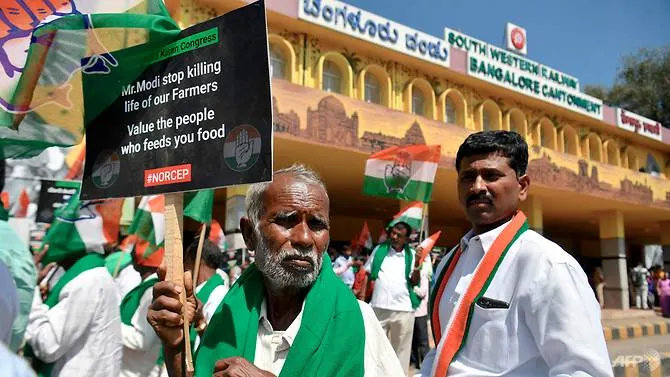India will not join RCEP trade deal in blow to sprawling Asian pact
05 November, 2019

India said Monday (Nov 4) it would not join a sprawling Asian trade pact, raising fears over how domestic producers would be hit, in a major blow for what could be the world's largest trade deal.
The Regional Comprehensive Economic Partnership (RCEP) was meant to account for 30 per cent of global GDP and loop in half of the world's people.
But India dug in over concerns about market access, fearing its domestic industries would be hard hit if the country was flooded by cheap Made-in-China goods.
"We have conveyed to the participating countries that we will not be joining the RCEP," Vijay Thakur Singh, a senior diplomat in charge of East Asia for India's Ministry of External Affairs.
"Our decision was guided by the impact this agreement will have on the ordinary human beings of India and livelihood of people, including the poorest of the poor," she said.
“Present form of the RCEP Agreement does not fully reflect the basic spirit and agreed guiding principles of RCEP,” prime minister Narendra Modi was quoted saying by Indian public broadcaster Prasar Bharati News Services in a tweet. “It does not address satisfactorily India’s outstanding issues and concerns.”
“It is not possible for India to join the #RCEP Agreement,” the broadcaster further quoted Modi as saying in the tweet.
The dramatic pullout comes after frenzied negotiations at the Association of Southeast Asian Nations (ASEAN) summit in Bangkok, which closed Monday evening.
The meeting was dominated by trade issues - with RCEP front and centre - backlit by the crippling US-China tariff war threatening to drag global growth.
The decision is a major blow to the deal, which intended to loop in all 10 ASEAN states plus China, Japan, South Korea, Australia and New Zealand - notably excluding the US.
Remaining members said they were aiming to sign the deal next year, after legal review of the draft terms of the text agreed Monday.
The news came after a full day of meetings at the ASEAN summit in Bangkok, attended by the leaders of Japan, South Korea, and India, along with China's premier.
Notably absent was a top US official after Washington sent commerce secretary Wilbur Ross and national security advisor Robert O'Brien in lieu of President Donald Trump.
OPEN DOOR
India's decision dashed hopes of closing the RCEP deal at the summit after seven years of gruelling negotiations.
A senior trade diplomat with knowledge of the negotiations said Modi did not budge because he was under domestic pressure.
But the diplomat held out the option that India could join at a "later date" even after it is signed, if outstanding issues are resolved.
China's deputy foreign minister Le Yucheng echoed that view.
"Whenever India is ready, it is welcome to get on board," he said before New Delhi confirmed its pullout.
As negotiations were being finalised Monday, the ASEAN bloc and its allies espoused open trade in the region.
"We are once again faced with the high winds of trade protectionism," said South Korean leader Moon Jae-in.
"We need to protect the free-trade order ... and bring the global economy back on track."
Source:
TAG(s):
